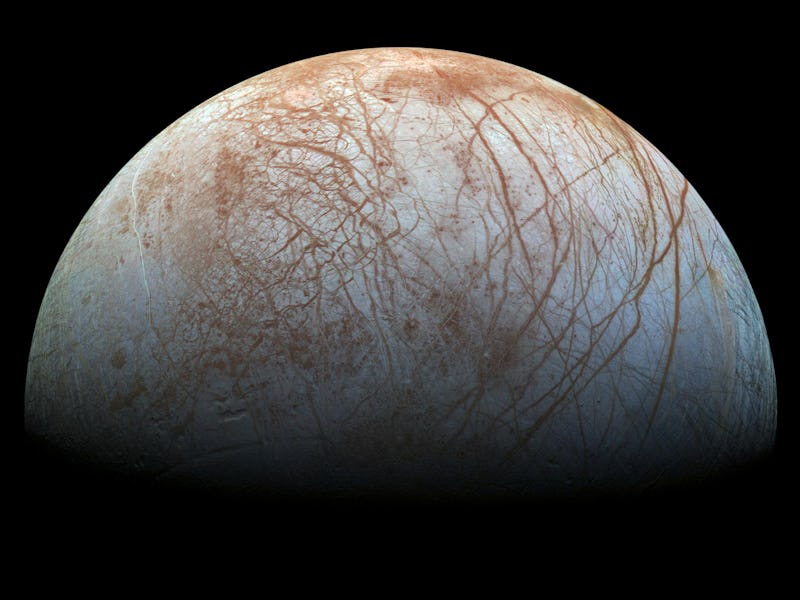Will NASA Announce the Discovery of Life on Europa Next Week?

NASA found something on one of Jupiter’s moons, but it’s not telling us what it is yet.
The space agency will hold a media conference on Monday to announce its findings about Europa, the smallest of Jupiter’s four Galilean moons, and the sixth-largest moon in the solar system. And we at Inverse are already super excited to ponder what new discoveries will be revealed to the world.
Europa, an icy world just a bit smaller than the moon, is a hotbed of research related to extraterrestrial habitability and astrobiology. This is primarily because it possesses a subsurface ocean of liquid water more than double of how much is present on Earth. Water is the single most important factor scientists look for when assessing whether a new world could host life — or perhaps already does.
But there’s more to the evolution of life than just water. Europa is still colder than the planet Hoth — and although we’ve already seen life find a way in some of the most frigid places on Earth, it’s worth emphasizing that more mild temperatures or helpful chemical processes would certainly help speed things up.
Artist's rendering of a possible Europa spaceship orbiting the room.
And there is a strong chance NASA’s announcement — based on new images of Europa taken by the Hubble Space Telescope — will reveal it found one or more of things.
What might they be? In the first case, scientists are most interested in learning whether Europa has volcanic activity underneath the surface that could provide hydrothermal effects and keep some parts of the ocean warm enough for lifeforms to make a home. Hubble may have detected some spots on the surface that indicate hotter parts of the ocean due to an active core.
And if there isn’t any volcanic activity? A NASA study published earlier this year suggested serpentinization on Europa could encourage the production of hydrogen and oxygen in a way that encourages the evolution of life.
Did NASA straight up find aliens? That’s extremely unlikely — Hubble is not really equipped to spot little microbes running around on Europa. Instead, we’ll probably be treated to some new data that suggests Europa has some qualities similar to Earth that could help foster life.
We’ll most likely get some color on why this important from Britney Schmidt, a planetary scientist at Georgia Tech in Atlanta, who helps lead a research group investigating how life on Europa could evolve. Schmidt’s presence at the conference means whatever Hubble found has almost certainly raised the specter of extraterrestrial habitability on Europa.
Furthermore, the new findings are certain to refocus everyone’s attention on proposed and planned missions to to study Europa directly, including ESA’s JUpiter ICy moons Explorer (JUICE) probe probe launching in 2022 and NASA’s planned Europa Multiple-Flyby Mission happening next decade. Both of those missions could perhaps confirm we’re not alone in the universe.